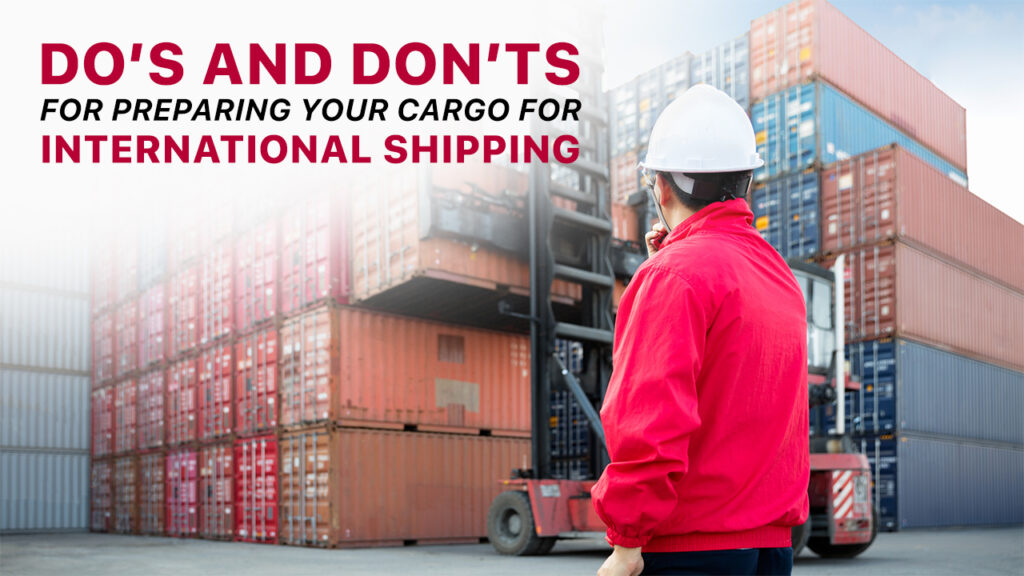Sending goods abroad is now simpler than ever, thanks to the Worldwide Logistics Service. If we decide to uproot our life and relocate abroad, we can now really pay to ship and transfer entire homes’ worth of furniture and possessions. Isn’t it an intriguing idea? However, while using international shipping for either commercial or personal reasons, there are a few guidelines that must be observed, just like with anything else. Similarly, being a global freight shipper there are a few things and rules you need to take into account before deciding whether or not to export something abroad.
First things first, let’s talk about the preparations you should make sure you’re making before you start worldwide container shipping. You wouldn’t anticipate a buyer for your home to come along without going through the rigmarole of seeing, haggling, and ultimately signing a legally enforceable contract, would you?
That’s just an illustration of why you shouldn’t ship abroad until you are certain that you are doing it correctly.
Let’s dive in, Shall we?
Packing the Shipments with Appropriate materials
Make sure your product is properly and materially packaged. Always keep an eye on your goods so that it is properly wrapped before shipping them over the ocean, whatever they may be.
Let’s consider the example of packaging a fragile good. It’s unlikely that even the most basic of coverage will keep it secure and intact for the duration of its travel. more so if it is traveling thousands of kilometers. If so, you should cushion the product with bubble wrap and foam paper, among other materials. Additionally, it’s a good idea to mark the package as “fragile” so that anyone who handles it knows how delicate it should be. Have you ever thought about how much plastic is required to wrap a typical product before it is packaged and shipped abroad? LOT is the solution. If you are well aware of watching the news, listening to the radio, or even just browsing the internet, you will be well aware that plastic is bad for the environment. If this is your “go-to” packaging, you should think about finding an alternative because many large firms have made improvements to limit their use of plastic. You can make the switch if McDonald’s can do so with its plastic straws, right?
If you’re in Business, Provide Alternate Shipping Options
We’ll now briefly discuss using overseas shipping for business-related products.
Due to its reputation for being pricey, “international shipping” has turned off many customers and clients in the present. Additionally, delivery costs may fluctuate appropriately.
In light of this, you don’t want to be turning away customers due to a lack of postal options. You can’t afford to be losing customers if they choose to shop elsewhere if they can’t afford the cost of international cargo shipping. What then can you do to assist with this problem?
You could look at some of the affordable shipping options available. It’s important to let customers know that this type of delivery will probably take longer; nevertheless, if they’re unwilling to pay the standard fee, it’s excellent to provide them with that option. After all, those who wait to get nice things!
What not to do
There are unavoidably do’s and don’ts in every field where there are “do’s.” Finally, let’s look at some international shipping mistakes to avoid making:
Using Labels Carelessly
No matter if you are sending anything for business or personal reasons, you cannot afford to be sloppy with labeling.
As we previously mentioned, overseas travel is pricey. Sending things to the wrong location will waste time, money, and effort, especially if you’re shipping multiple items at once.
Be very careful when writing labels and addresses on your products as a result. Try to set up some form of system. By doing this, you can avoid shipping delivery to the incorrect recipient or perhaps even the incorrect nation.
Ignoring International Laws and Regulations
Last but not least, while sending overseas, never disregard other countries’ postal restrictions.
For instance, some things may be regarded as unlawful contraband in certain nations. If you break these laws, you risk receiving a fine or, worse yet, legal action.
Concluding Words
So, the final piece of advice would be to examine the shipping rules of the nations where you’re posting as well. Know all the terms and conditions before sending your cargo for worldwide shipments. Being safe is much preferable to being sorry (and facing legal consequences!)

